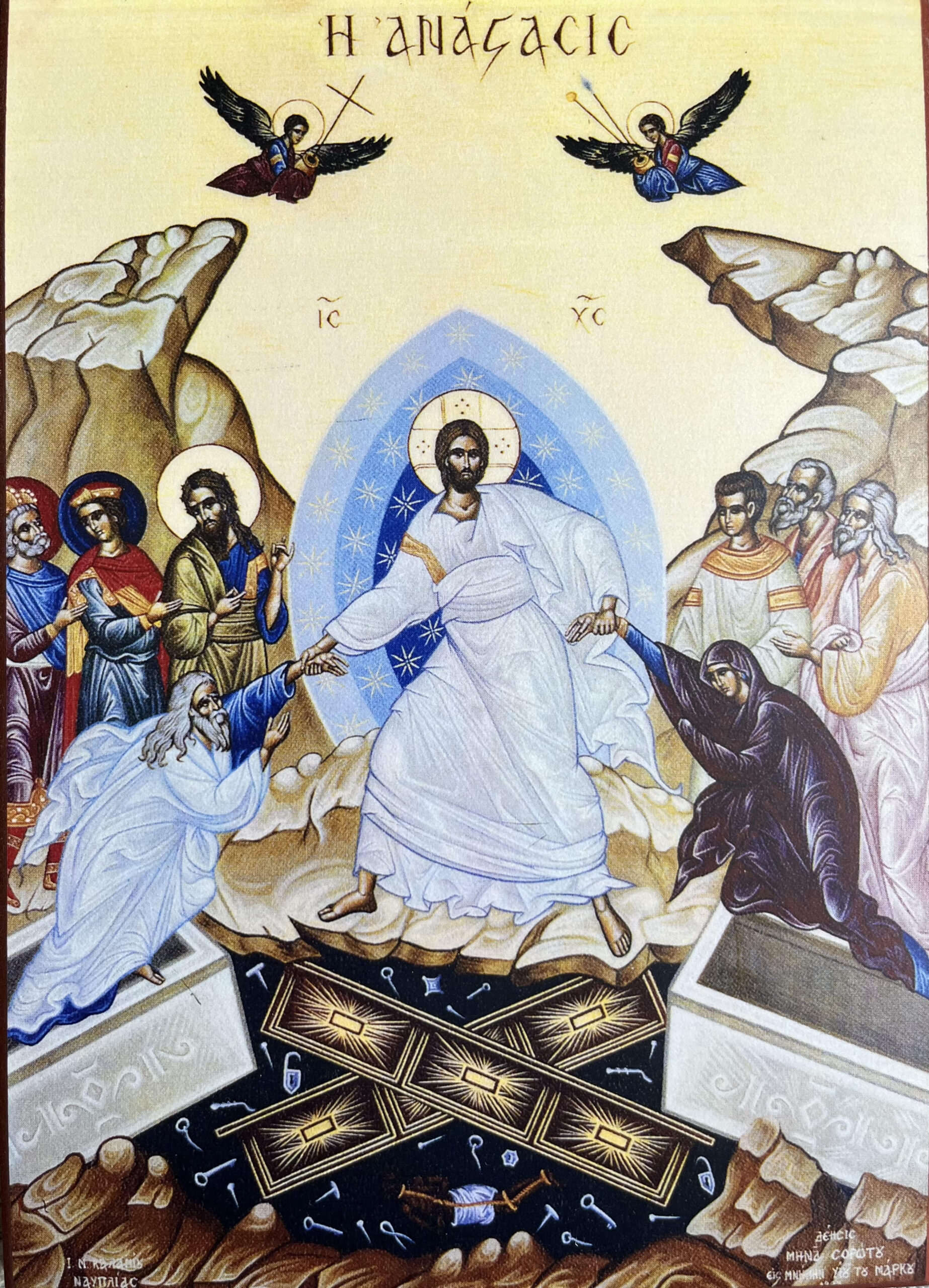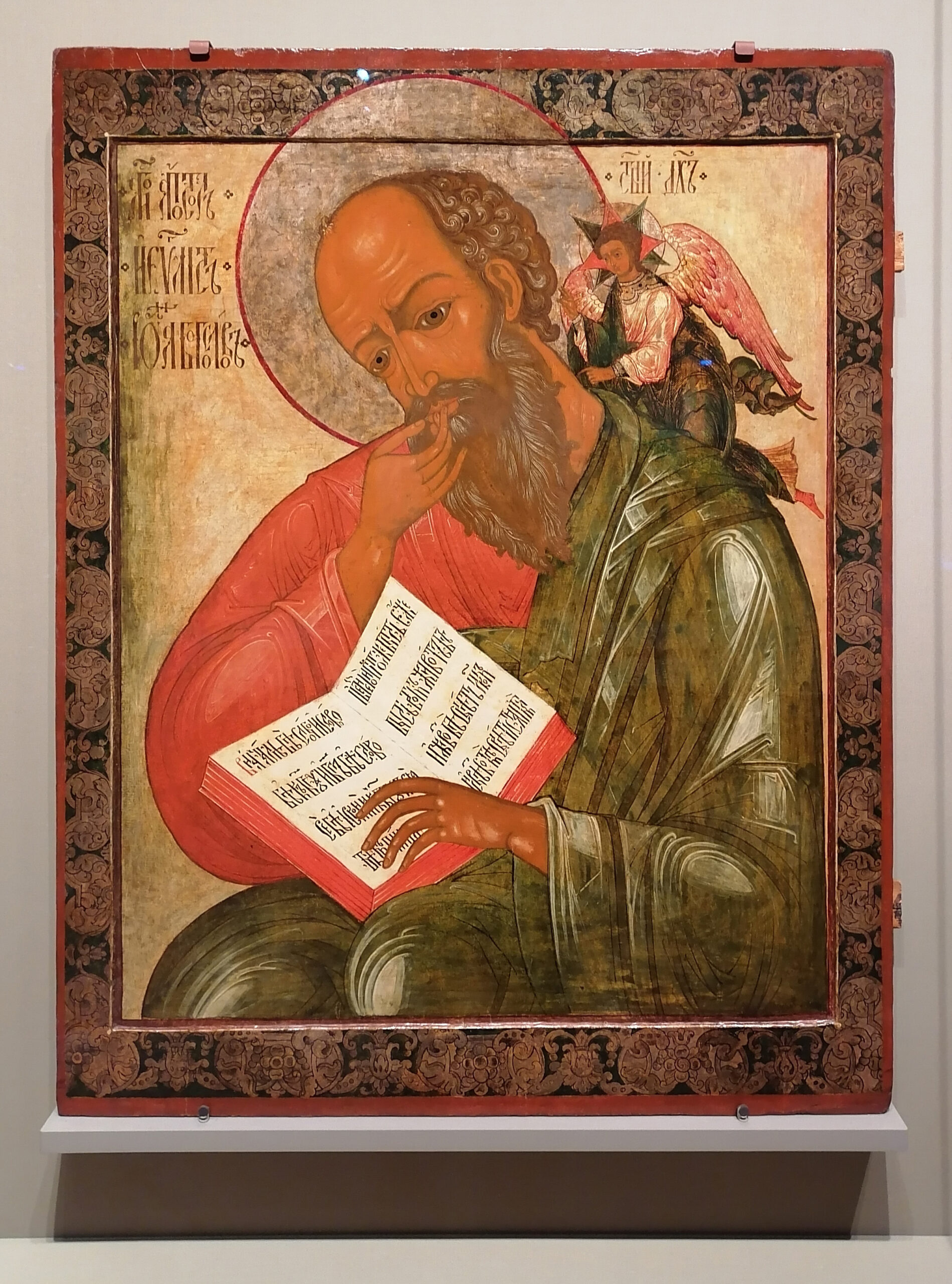It is the day of the Resurrection. Let us shine forth in splendor for the Festival, and embrace one another. Let us say, “O brethren, even to those who do not love us; let us forgive all things in the Resurrection, and thus let us exclaim: (Doxastikon, Praises, Pascha, Trans. by Fr. George Papadeas) ‘Christ is Risen from the dead by death trampling down upon death, and to those in the tombs, He has granted life.’” (Translation of the Greek Orthodox Archdiocese of America)
—
Blessed be the God and Father of our Lord Jesus Christ! By His great mercy we have been born anew to a living hope through the Resurrection of Jesus Christ from the dead, and to an inheritance which is imperishable, undefiled, and unfading, kept in heaven for you, who by God’s power are guarded through faith for a salvation ready to be revealed in the last time. In this you rejoice, though now for a little while you may have to suffer various trials, so that the genuineness of your faith, more precious than gold which though perishable is tested by fire, may redound to praise and glory and honor at the revelation of Jesus Christ. Without having seen Him you love Him; though you do not now see Him you believe in Him and rejoice with unutterable and exalted joy. As the outcome of your faith you obtain the salvation of your souls.
I Peter 1: 3-9
Christ is Risen!
If only we could make the words of this hymn true, it would be a game changer for our world. Can you imagine what it would be like if we could indeed forgive all things in the Resurrection?
This hymn is sung throughout the Paschal season. However, even after the Paschal season ends, every day “is the day of the Resurrection.” We live in this reality. It’s like for the married couple who can say every day, “It is the day of our marriage.” Because every day is a day of marriage for those who are married. And every day is a day of the Resurrection for those who are Christians. We live in this reality at all times, and we live in the expectation of our own personal resurrection at all times. Thus, this hymn is for all times.
We are to “shine forth in splendor for the Festival.” In our parishes, we deliberately decorate the church for the Paschal celebration. We put away the dark purple and black decorations of Holy Week, and we decorate with our best and brightest colors. In the churches I have served, we have always used white. Other churches use gold or red. However, each church uses the best they have. Imagine if we clothed our souls in this way, putting forth the best we have, in terms of behavior, outlook, encouragement, positivity, motivation and hope.
When we “embrace one another,” there is a sense of brotherhood/sisterhood, there is a sense of philanthropy, in the sense that we embrace one another as friends. Enemies do not embrace. And if they do, it’s because the coldness between the two enemies is waning and warming. People generally embrace one another with joy, not with anger. Imagine if we embraced one another with joy and did so frequently.
The next part of this hymn is the most challenging, “let us say, O brethren, even to those who do not love us; let us forgive all things in the Resurrection.” We all have people we avoid. Some we may call our enemies, some we may just disregard and stay away from. We do not call them “brethren.” Perhaps it is because we don’t like them, or because they don’t like us, or there is a mutual dislike. Imagine if we could reach across the gulf that is between us and others and come to a place where we can call one another “brethren,” even to those who have wronged us.
Some translations of this hymn say “let us forgive all things in the Resurrection” and others say “Let all things be forgiven in the Resurrection.” Both mean essentially the same thing. Let us wipe the slate clean in the Resurrection. Let all things begin anew, let the scorecard between us and one another go back to 0-0. Yes, many of us keep score of offenses amongst ourselves. If we truly forgive all things in the Resurrection, then all of the score of offenses go away. That is challenging, no matter what the score is. If the score is 10-10 (I have done ten things wrong to you and you have done ten things wrong to me), there is a lot of forgiving that is needed. But what if the score if 10-1, if I’ve done ten things wrong to you and you have only done one to me, that means you would have to offer ten times the amount of forgiveness that I would have to offer and that is VERY hard. Again, if all things could really be forgiven in the Resurrection, what a different world we could have.
It’s interesting that the hymn writer chose to speak first about the day of the Resurrection, shining in splendor, embracing one another, calling those who do not love us “brethren” and forgiving all things in the Resurrection, and THEN exclaiming “Christ is Risen.” He didn’t begin the hymn with “Christ is Risen” and then go to the other things. I.e. Christ is Risen, so let us shine in splendor, forgive, etc. It is as if the hymn says that IF we are to exclaim that Christ is Risen, and to proclaim that He grants life to those in the tombs, which one day will be each of us, we can affirm this or hope for this if we have been unable to shine in splendor, embrace even those who don’t love us and forgive all things. We read many times in the Bible, most especially in the Lord’s Prayer, that God will forgive us our trespasses as we forgive those who trespass against us. God will forgive us, in the same manner in which we have forgiven one another.
This hymn is a hymn of direction for us. We must first get our own house in order—to shine in splendor, to embrace one another, to restore as brethren those who do not love us, and to forgive all things, and THEN we can proclaim the Resurrected Christ, with hope for life being granted to those in the tombs.
Of course, this is much easier said than done. We also know that God rewards effort, not success. We also know that we may forgive others who may choose to not forgive us. In trying to live out the words of this hymn, let us make an effort to do these things—to shine in splendor (giving God our best), to embrace one another, to restore one another and to forgive one another. And then let us exclaim “Christ is Risen” with confidence and with conviction. Because if we have done these things, surely our exclamation will be with more of both.
This day, which the Lord has made, we shall rejoice and be glad in it.
A Pascha of delight; a Pascha, the Lord’s Pascha; an all-venerable Pascha has dawned for us; a Pascha on which, let us embrace one another with joy. Oh! Pascha redemption from sorrow! For from the tomb today, as from a bridal chamber, Christ has shone forth, and filled the women with joy, saying: “Proclaim it to the Apostles.” (Praises, Pascha, Trans. by Fr. George Papadeas)
Allowing all things to begin anew in the Resurrection would change our world and each life in it. Let us shine in splendor, embrace one another, forgive one another, and give our best effort for things to begin anew in the Resurrection, which is not a reality just on Pascha, but something that should be a daily reality for us!

